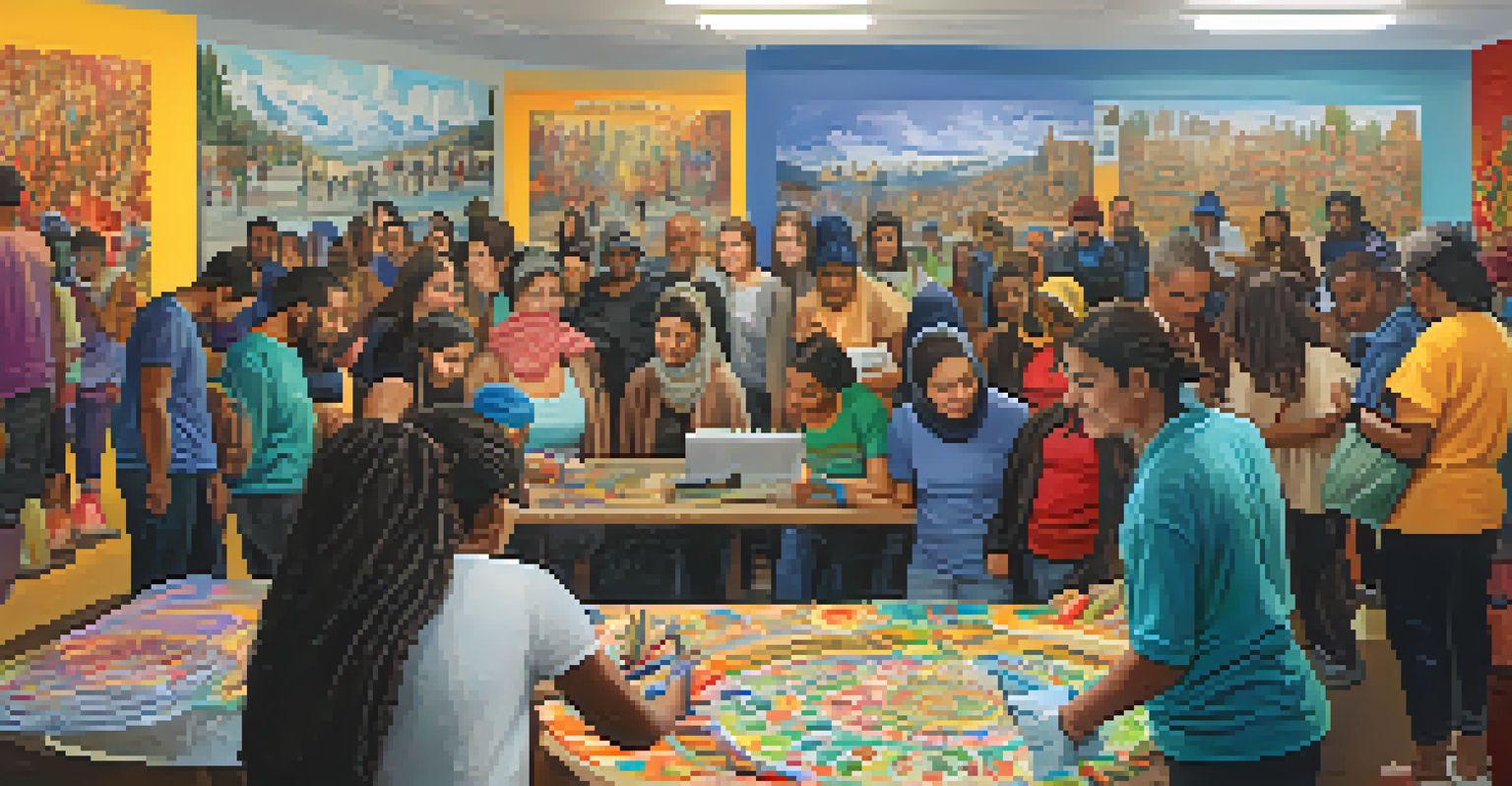Crisis Intervention for Refugees: Addressing Unique Needs

Understanding the Refugee Crisis and Its Impact
The refugee crisis is more than just a statistic; it represents millions of individuals fleeing conflict, persecution, and disaster. Each refugee carries their own stories of trauma and loss, making their needs unique and complex. Understanding the nuances of their experiences is crucial for effective crisis intervention strategies.
Refugees are not just statistics; they are human beings with dreams, hopes, and aspirations that deserve to be heard and understood.
Many refugees face immediate threats to their safety and well-being, which can lead to acute mental health issues such as anxiety and depression. This distress can be exacerbated by cultural dislocation and the challenges of adapting to a new environment. Identifying these issues is the first step toward providing the necessary support.
By recognizing the psychological and physical challenges refugees encounter, we can tailor intervention programs that genuinely address their unique needs. This understanding forms the foundation for effective crisis intervention and lays the groundwork for successful integration into host communities.
Identifying Unique Needs of Refugees
Every refugee has distinct needs influenced by their personal history, cultural background, and the circumstances of their displacement. It’s essential to conduct thorough assessments that consider these factors as they shape the support required. For instance, a refugee from a war-torn area may have different psychological needs than one fleeing economic hardship.

Language barriers can also significantly hinder access to resources and support services. Without effective communication, refugees may struggle to articulate their needs, leading to feelings of isolation and frustration. Therefore, providing interpreters or multilingual resources can facilitate better understanding and connection.
Understanding Refugee Needs
Recognizing the unique circumstances and challenges faced by refugees is essential for developing effective support and intervention strategies.
Additionally, social support networks play a vital role in the well-being of refugees. Creating community connections can help mitigate feelings of loneliness and promote resilience. By fostering these networks, we can enhance the effectiveness of crisis interventions by ensuring refugees feel supported and understood.
Cultural Sensitivity in Crisis Intervention
Cultural sensitivity is paramount when addressing the needs of refugees. Understanding cultural norms and values can greatly enhance the effectiveness of crisis intervention strategies. For example, some cultures may prioritize community support over individual therapy, and recognizing this can shape how services are offered.
The only way to deal with the refugee crisis is to address the root causes of displacement and create solutions that empower refugees in their new communities.
Being culturally sensitive also means acknowledging and respecting different coping mechanisms that refugees may employ. Some may prefer to express their feelings through storytelling or communal rituals rather than traditional therapeutic approaches. By adapting interventions to fit these cultural expressions, we can create a more inclusive support system.
Incorporating cultural competence into training programs for crisis intervention professionals is crucial. This training can empower service providers to engage authentically with refugees, fostering trust and encouraging more open communication about their needs and experiences.
Developing Comprehensive Support Systems
A comprehensive support system for refugees should encompass mental health services, legal assistance, and social integration programs. These interconnected services ensure that refugees receive holistic support tailored to their unique situations. For instance, mental health professionals can collaborate with legal advisors to help refugees navigate the complexities of asylum processes.
Additionally, integrating vocational training into support systems can empower refugees to rebuild their lives. By equipping them with skills relevant to their new environments, we can help them gain independence and contribute to their host communities. This approach not only benefits refugees but also enriches the local economy.
Cultural Sensitivity Matters
Incorporating cultural competence into crisis interventions ensures that services align with the values and coping mechanisms of refugee communities.
Lastly, involving refugees in the development of these support systems is vital. Their insights can lead to more effective and relevant services. By actively including their voices in decision-making processes, we can create a support framework that truly reflects their needs and aspirations.
Mental Health Challenges Faced by Refugees
Refugees often grapple with mental health issues stemming from their traumatic experiences. Conditions such as PTSD, anxiety, and depression can emerge from the stress of displacement, loss of loved ones, and uncertainty about the future. Addressing these mental health challenges is critical for their overall well-being.
Access to mental health services can be limited for refugees due to stigma, lack of resources, or language barriers. Therefore, it is essential to create safe, welcoming environments where refugees feel comfortable seeking help. Community outreach and education can play a significant role in reducing stigma and encouraging individuals to access the support they need.
Additionally, culturally competent mental health professionals can make a profound difference. These professionals understand the specific traumas faced by refugees and can offer therapies that resonate with their cultural experiences. This tailored approach can promote healing and resilience among refugee populations.
Community Engagement and Empowerment
Engaging the local community is crucial in supporting refugees during their resettlement process. Community members can serve as allies and advocates, helping to bridge gaps between refugees and available resources. This collaboration not only strengthens the support network for refugees but fosters a sense of belonging within the community.
Empowerment initiatives, such as community-led projects, can also play a significant role in integrating refugees. By involving them in decision-making and project implementation, we can help build their confidence and skills. This not only benefits the refugees but also enriches the community with diverse perspectives and experiences.
Community Engagement is Key
Engaging local communities in supporting refugees fosters a sense of belonging and helps dispel myths, enhancing integration efforts.
Moreover, community engagement can help dispel myths and misconceptions about refugees. By promoting understanding and empathy, local residents can become advocates for their refugee neighbors, creating a more inclusive environment. This collective effort is vital for fostering a harmonious coexistence.
Measuring the Success of Crisis Interventions
Evaluating the effectiveness of crisis interventions for refugees is essential for continuous improvement. Success can be measured through various indicators, such as refugees' mental health outcomes, integration into the community, and overall satisfaction with the services received. Regular feedback from refugees themselves can provide invaluable insights into what works and what needs adjustment.
Surveys, interviews, and focus groups can be effective tools for gathering this feedback. By actively involving refugees in the evaluation process, we demonstrate our commitment to meeting their needs. This participatory approach not only enhances the quality of services but also empowers refugees to be active contributors to their own well-being.

Ultimately, successful crisis intervention is about creating a responsive and adaptive support system. By regularly assessing and refining our strategies, we can ensure that we are effectively addressing the unique needs of refugees and helping them rebuild their lives.